What Are Keywords On Google AdWords
Keywords might be the single most important aspect of Google AdWords, without them you wouldn’t have a focus. In short the keywords are the words or phrases you want to show up for on Google, and in return you pay Google per click (pay per click). If you are brand new to AdWords, Google is going to take advantage of your newness and potentially send irrelevant traffic to your business. This will result in you wasting money each and every day on their platform.
Let me explain this a little further; when you first create your account, Google will tell you to add keywords. Sounds simple right? Not exactly, Google recommends to select keywords, but in the beginning if you don’t use these symbols (+, “, [ ]) before your keywords, you will only have unmodified broad match keywords.
The keywords will look like this (+keyword, “keyword”, and [keyword]). By adding these symbols in front of your keywords this changes your match type, the plus signs will make your keyword become modified broad, the quote marks make your keywords phrase match, and the brackets turn your keywords into exact match.
I touched on what unmodified broad match keywords are in my older post, but I will go in more detail later on in this post, and why unmodified broad keywords are not the best and are a huge waste of money.
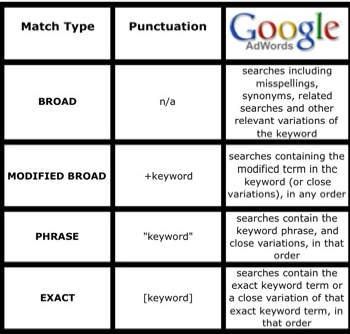
Use Google’s Keyword Planner
To find relevant keywords for your business you should use the keyword planner tool by Google. You can type in a bunch of keywords just separate them by adding a space and a comma. You will even get recommendations by Google on similar keywords related to your search.
I recommend you manually type keywords in that you find relevant to your business, but to get a jump start you can type or paste your business’ URL into the keyword planner and the keyword planner will crawl your website and find keywords on your site. Some will be good and others will be bad, so just add the relevant ones.
If we use the example of “mens sunglasses”, you will see I have typed in other related keywords to men’s sunglasses and then Google has made recommendations of other keywords that are similar.
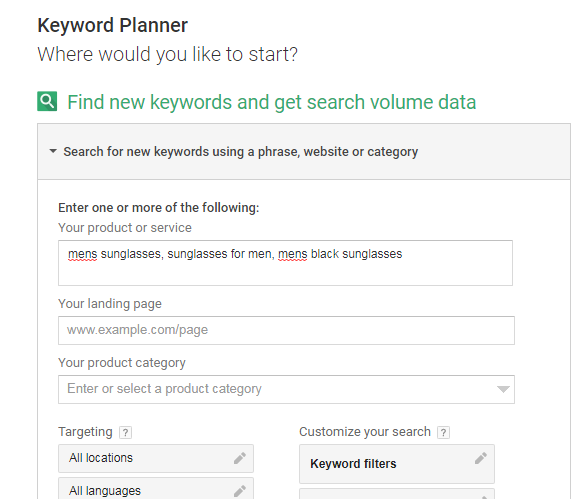
Apply Filters On Keyword Planner
If you are in the seasonal business you should do this type of keyword research to better understand your market. Just make sure you are prepared for the increase in traffic to your business.
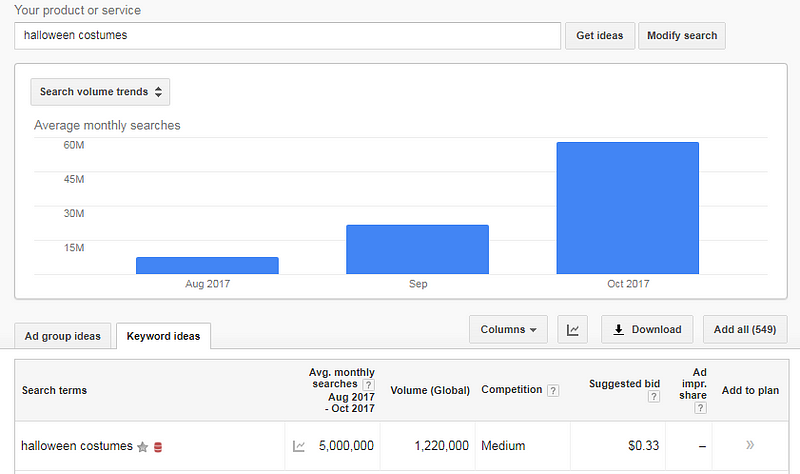
Another filter you can apply to the keyword planner is adding a filter for keywords that you want recommendations on. As I mentioned before when you enter keywords into the keyword planner Google will give you recommendations.
You can filter these recommendations, for example if you enter a bunch of sunglasses related keywords you might get some glasses recommendations. When you use the filter you can add one to only show keyword recommendations that include “sunglasses”. Be advised that, this will narrow your recommendations, but they may not all be relevant to your business.
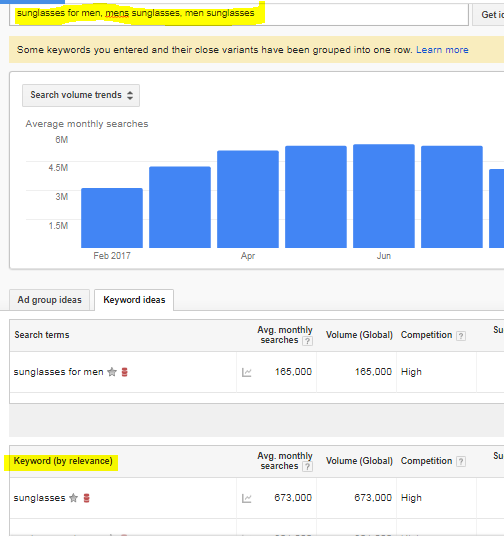
Google AdWords Keyword Match Types
I mentioned the different keyword match types briefly above, but to recap there are 4 different match types you can use in Google AdWords. They are unmodified broad, modified board, phrase, and exact match. Say we are selling mens sunglasses. The keywords we want to focus on would be +mens +sunglasses, “mens sunglasses”, and [mens sunglasses].

Modified Broad Match Keywords
Modified broad match with the plus signs simply means the keywords men’s and sunglasses has to be in the phrase the user searched on Google. That may sound a little confusing, so let me break that last part down a little further.
Let’s say we are bidding on the keyword +mens +sunglasses and say we have a $2 bid set. This means we are willing to pay $2 per click. A search term is what the potential customer is searching on Google, so for +mens +sunglasses to be triggered someone on Google can search “sunglasses for men” and there is a good chance our keyword would be triggered.
Some more examples of search terms that would trigger out keyword could be “mens black sunglasses”, “sunglasses in blue for men”, and “mens white sunglasses near me”. So you see a lot of potential searches can be triggered from our modified broad keyword.

Phrase Match Keywords
If you have a smaller monthly budget or are just starting to use AdWords I recommend you start out with Phrase and Exact match keywords only in the beginning. Phrase match keyword work like this, if we are bidding on “mens sunglasses”, these two keywords have to be in this order to trigger a search term.
Search terms that would trigger this phrase keyword would be “mens sunglasses near me”, “mens sunglasses black”, and “stylish mens sunglasses”. Other search terms will trigger this keyword, but I wanted to keep this simple and to the point, as I hope this starting to all make sense now.

Exact Match Keywords
Basically the exact match keyword triggers plural and singular searches. If you have a really small budget exact match keywords are the best, you won’t get many clicks but you will get the best quality traffic that are looking exactly for your products/services.

Unmodified Broad Match Keywords
These types of keywords get the most traffic to your website because search terms similar to the keywords would be triggered. When you’re paying per click, I believe quality over quantity is always the right way to go.
Unmodified broad match will trigger keywords such as “mens glasses”, “male glasses”, and “boys sunglasses”. As you can see glasses and sunglasses are similar but also completely different, just like mens and boys are similar but also different. These keywords have a low CPC (cost per click) but will bring a lot of traffic to your website most of it being low quality. I highly suggest you don’t use this match type.

Conclusion
I hope this blog helped you get a better understanding of how the different keywords work on Google AdWords. If you are running an AdWords account I recommend you start with phrase and exact match keywords only if you have a small budget, but you can also use modified broad match, just make sure you keep an eye on the search terms to make sure they are all relevant.
If you are in the setup phase of your own account use the Google keyword planner or keyword.io to generate the keywords monthly search volume as well as recommendations for other keywords that are relevant to your business. Please leave a comment below if this blog helped you or if you need more information about a certain section. For more marketing insights you can checkout my website here.
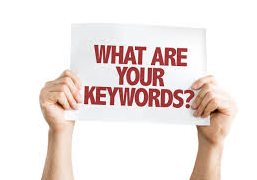
References: https://jonathandarcio.weebly.com/google-keyword-planner.html
